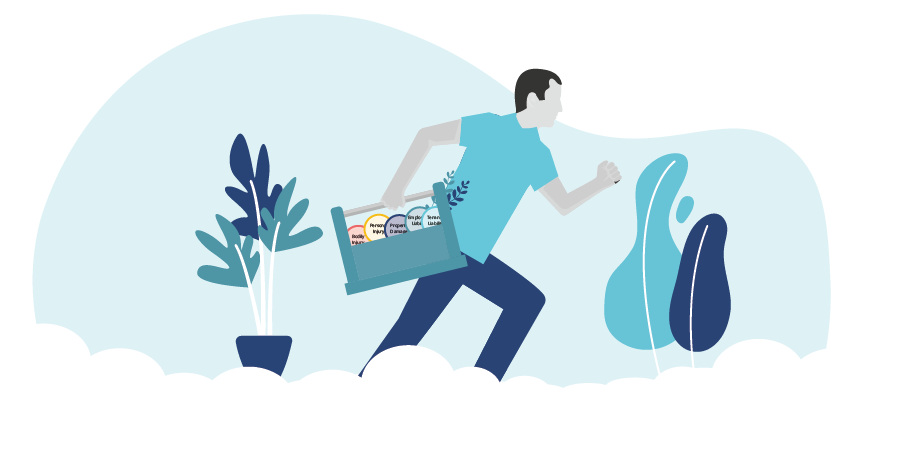Your Commercial General Liability Coverages Explained
December 10, 2020

Commercial General Liability (CGL) Insurance protects your business from third-party claims of bodily injury, property damage, and reputational harm caused by your professional activities or company operations. While it’s not mandatory for most companies in Canada, it is essential to preserve your staff, your business, and above all, your financial security.

But finding the right coverage can be tricky. After all, we all know how confusing insurance policies can be. What’s really covered? Are your employees included? How does it stack up against all of your other professional insurance policies? To clear things up, here’s an in-depth look at the various coverages included in a standard CGL policy.
Disclaimer: Please note that the information provided herein offers guidelines only. It is not exhaustive nor will it apply to all policies, individuals, situations, or circumstances. The specific terms of your policy will always apply.
Bodily Injury
Bodily Injury refers to physical injury, disability, sickness, or disease caused by your business operations, including death from any of these at any time. Your CGL policy will cover expenses related to medical bills, pain and suffering, lost wages, and funeral costs.
Some key points:
-
A “third-party” doesn’t just mean clients. Bodily injury can happen to anyone who’s physically present at your business, including: clients, customers, business partners, maintenance personnel, suppliers, vendors, delivery persons, bystanders, or any other type of visitor.
-
Location isn’t a factor. Did you know that you can still be sued for injuries that don’t occur on your commercial property? Luckily, CGL Insurance will cover you for injuries incurred anywhere you or your staff conduct business, including public spaces and your client’s office, worksite, or home.
-
Mental injury counts. Even in the absence of physical harm, your CGL policy offers coverage for mental anguish and emotional distress that arise from an interaction with your company (e.g. PTSD, shock, anxiety and/or panic attacks). However, all conditions must be medically documented for coverage to apply.
The most common example of a bodily injury claim? The classic slip-and-fall. Whether they’ve tripped on a doormat, an icy walkway, or even over their own two feet, if someone slips on your premises and breaks their hip, you could be liable, even if they’re responsible for the injury.
Other instances where Bodily Injury coverage will kick in include:
-
A client gets bitten in the waiting room of your veterinary clinic.
-
A customer is hit by a forklift in your store and sues you for a broken leg and mental anguish resulting from the injury.
-
A vendor bumps into a vase in your office while making a delivery and cuts their hand on glass.
PRO Tips:
If you don’t already have security cameras in your workplace, consider installing them to ensure there’s proof of injury in the event of a CGL claim. This is particularly important for any landlords or tenants who are responsible for outdoor maintenance, since proposed changes to Ontario’s Occupiers’ Liability Act will require parties injured due to ice or snow to notify occupiers within 60 days of the occurrence. Video footage of an accident might just free of you any potential liability—but make sure your system is programmed to preserve the footage for longer than 60 days!
Property Damage
Property Damage Liability offers protection if you, your employees, services, affiliated personnel, or anything else associated with your company causes damage to a third-party’s property or belongings.
In the event of a claim, CGL Insurance will pay the injured party compensatory damages to restore things back to the way they were before the incident—financially speaking, of course. Say a pipe bursts in your office and floods the business downstairs. You’ll be legally responsible for supplying furniture and materials of a similar quality, but not for upgrading their tech equipment or building them a brand new state-of-the-art-boardroom.
Here are some other examples of Property Damage claims covered by a CGL policy:
-
You spill coffee on a client’s white couch during a meeting at their home.
-
An employee drops a customer’s smartphone and the screen shatters.
-
A customer claims their vehicle was scratched while it was in your automotive body shop.
-
You hit an electrical line during a digging operation, causing a small fire that damages your client’s office.
-
Construction workers renovating your office accidentally smash a neighbouring business’s windows.
Personal & Advertising Injury
While most people associate the term “injury” with physical pain or trauma, in the insurance world “personal and advertising injury” actually refers to allegations of reputational harm, including character damage or disparagement of a person or organization’s goods, products, or services. In select cases, this coverage may also apply to any consequential bodily injury arising from the following offences:
-
Libel (putting defamatory statements in print, unless the material was published with knowledge of falsity);
-
Slander, or verbal defamation;
-
Copyright infringement;
-
Use of another’s advertising idea;
-
Wrongful eviction from, entry into, or invasion of privacy (often committed by or on behalf of its owner, landlord, or lessor); and
-
False arrest, detention, or imprisonment (e.g. falsely detaining someone you believe was trying to steal from your organization).
To be clear, this coverage only protects you if you’re accused of defaming, libeling, or slandering someone—not when someone does it to you. Examples of Personal and Advertising Injury claims include:
-
Your website publishes a photo that disregards copyright regulations. The artist becomes aware and files a lawsuit.
-
Your business publishes a post comparing a product on your site to a competitor’s. The post contains false claims about your competitor, who sues you for libel.
-
You and a colleague are discussing one of your clients in public. A friend of your client overhears and informs them, who reports you for slander.
-
Your store suspects a customer of shoplifting and calls the police. The police arrive and arrest the customer, but upon review of the surveillance video, they learn the customer did not shoplift. The customer sues the store for false arrest.
Although no overt physical harm or damage is caused by these situations, these forms of general liability can easily rack up thousands in legal fees and diminish clients’ goodwill.
Medical Payments Coverage
This protection offers limited coverage for medical expenses for minor injuries sustained by a non-employee from an accident at your company premises or due to your company operations. Medical expenses include all necessary and reasonable medical, surgical, ambulance, hospital, dental, professional nursing, and funeral expenses for a person injured or killed as a result of your business’s actions or inaction.
Sounds just like Bodily Injury coverage, right? The difference is: Medical Payments Coverage is provided on a no-fault basis—it’ll apply even if you’re not held legally liable for the accident. In fact, Medical Payments Coverage doesn’t require any legal action at all to be triggered.
Here’s an example: an individual suffers a minor injury on your commercial property, like a broken toe or a sprained ankle. In order to avoid litigation, your CGL policy will pay a predetermined amount of cash (usually between $500 and $10,000), depending on how much coverage you purchased.
Basically, Medical Payments Coverage is a quick and easy way to settle a smaller medical claim without having to get into a full-blown, costly lawsuit. Depending on your policy, Medical Payments Coverage may be included automatically or can be added as a separate insuring agreement.
Tenant's Legal Liability
If you rent or lease any commercial property (e.g. an office, workspace, or retail space) and are held legally responsible for a fire, explosion, smoke damage, or other damage caused by fire protection (e.g. sprinklers or fire extinguishers), this coverage will pay compensatory damages to your landlord. For example, if one of your employees leaves a candle burning at their desk overnight and the entire office tower catches fire, Tenant’s Legal Liability will cover the cost of repairs and replacement.
Keep in mind: this coverage only applies to damage to the rented or leased premises occupied by you, not the property or contents your business owns. To safeguard your products, inventory, and fixtures, you’ll need your own commercial Property Insurance.
Defence Costs
Even if the claim is groundless, a CGL policy will cover the cost of your legal defence, including attorney’s fees, expert witness fees, court costs, and more, subject to your policy limits. If you’re found liable, your CGL policy will also pay all compensatory damages, judgements, and settlements.
Products Liability
Products Liability coverage kicks in when bodily injury or property damage is caused by a faulty or defective product that you sell or supply. This protection isn’t automatically included in basic CGL policies, but is typically available for an additional fee.
Remember, you can be sued as long as the product leads to any kind of damage or injury, even if it’s from a client’s misuse. That’s why Products Liability is crucial for any business that designs, manufactures, or distributes products.
The most common types of product defects fall into these categories:
-
Design: “Defects” stemming from an inherently unsafe or structurally unstable product design. These defects occur prior to production, even if the product was manufactured as intended. Examples include sunglasses that fail to protect the eyes from UV rays or temporary tattoos made with harsh, toxic ingredients that lead to an allergic reaction.
-
Manufacturing: Defects that occur during the production and/or assembly of the products. Manufacturing defects occur regardless of design or marketing and generally affect only a small number of the total output. Common offenders include faulty packaging, contaminated or hazardous materials, and poor craftsmanship.
-
Marketing: “Defects” that come from a failure to warn consumers of an inherent, but non-obvious danger of the product. The biggest culprits here are usually inadequate or misleading safety warnings or insufficient user instructions.
Instances where Products Liability might come in handy include:
-
You manufacture and sell custom lights. Due to a design flaw, a light fixture becomes unstable and comes loose, damaging your client’s floor.
-
A customer becomes sick after eating at your restaurant.
-
A chocolate bar produced by your company fails to add a nut warning onto the label, leading to several claims for allergic reactions.
Employer's Liability
Employer’s Liability protects your business if an employee becomes sick or ill on the job due to employer negligence. Generally speaking, employees’ work-related injuries and illnesses are covered by provincial Workers’ Compensation Insurance, whether or not the employer is at fault. But Workers’ Comp isn’t mandatory for all businesses in Canada, including banks, trade unions, private healthcare practices and more (though they can still choose to register with their provincial board).
If you choose not to purchase Workers’ Comp, an injured or ill employee can file a lawsuit against you for failing to maintain your premises or equipment or negligence in protecting your staff. And if you’re found guilty, you’ll have to cover the full cost of your employee’s medical expenses, lost wages, rehabilitation benefits, and more.
For an additional fee, Employers’ Liability Insurance will provide funds for medical expenses, plus defense costs, judgments, and settlements. Employers’ Liability might even come in handy in some situations where you have Workers’ Comp, such as:
-
If the Workers’ Comp board in your province denies a claim or doesn’t cover the employee’s particular injury or illness;
-
If the employee sues the employer for damages related to the injury that Workers’ Compensation doesn’t cover (e.g. mental anguish);
-
If the employee has fallen ill with an disease that may be unrelated to their employment (Worker’s Comp only covers occupational diseases that arise out of the employee’s professional environment);
-
And more.
It’s important to note that Employers’ Liability is different from Employment Practices Liability (EPL) Insurance, which defends your business from employee claims of wrongful treatment, such as wrongful termination, discrimination, harassment, and more.
Non-Owned Automobile Liability
Non-Owned Automobile Liability is an optional coverage that provides protection when the personal vehicle of an employee, whether owned or rented, is driven for business purposes. If your employee is involved in an accident while performing company duties, your business could be liable for their actions.
But with Non-Owned Automobile Liability, you’ll be covered for third-party bodily injury or property damage and any associated defense costs if you or your employee are sued as a result of the accident, even if the claim is frivolous. Coverage includes vehicles operated by both permanent and temporary full-time and part-time employees. However, in order for coverage to apply:
-
The vehicle must be in-use for business purposes at the time of the accident; and
-
The vehicle cannot be owned, registered, or contracted in your business’s name or on your behalf.
Plus, Non-Owned Automobile Liability won’t cover the following exclusions:
-
Damage to property being transported within your car (e.g. company goods, products, files, etc.);
-
Any vehicles that are company-owned or regularly operated by your business (which should be covered by a Commercial Auto policy); and
-
Physical damage to the vehicle being operated by your employee or your employee’s injuries (which should be covered by the employee’s personal Auto Insurance policy or rental agreement).
Not sure if you need it? Have you ever asked an employee to rent a vehicle while on a business trip? Or to use their own car to:
-
Go to the post office or bank on your company’s behalf?
-
Pick up lunch or other office supplies?
-
Pick up a client from the airport?
Even if it’s once in a while or just for a quick errand here and there, this coverage is critical for all businesses, especially small businesses, that rely on a non-company owned vehicle for professional activities.
Still confused? Give us a call. Taking the time to understand your coverage and what it can do for you might make all the difference when it matters most. With over 40 years in the industry, PROLINK is equipped with the tools to help you make an informed decision and offer you a comprehensive insurance plan that suits your business needs.
PROLINK’s blog posts are general in nature. They do not take into account your personal objectives or financial situation and are not a substitute for professional advice. The specific terms of your policy will always apply. We bear no responsibility for the accuracy, legality, or timeliness of any external content.




